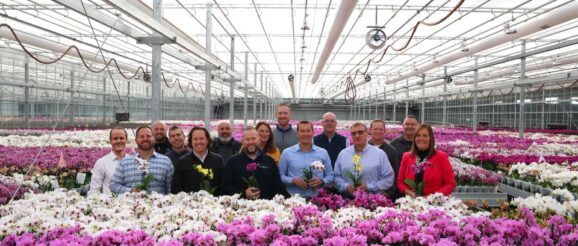Innovation Continues to Drive Success at Green Circle Growers – Greenhouse Grower

Green Circle Growers is always ahead of the game. It has grown significantly from its humble beginnings as a vegetable producer in 1968. Now a multigenerational family business that leads the industry in its use of technology, Green Circle finds new ways to innovate every day while holding its Dutch heritage close.
The leadership team at Green Circle Growers works together to make every day better with plants. All photos: Green Circle Growers
Green Circle Growers is home to a robust orchid production program.
At Green Circle, employees are treated like family, creating an enjoyable work environment.
Green Circle Growers has its own brands, including Wild Interiors, which features foliage, succulents, and signature plants.
Alocasia is part of the program for indoor foliage plants at Green Circle Growers.
This image shows the sorting buffer and each line has a different spec. With the help of Radio Frequency Identification (RFID) tags, the plants are pulled into the proper lines.
“The business is primarily about people and assembling a world class team to compete in the space,” the Co-CEOs say. “We’ve always believed this is critical to accomplishing our mission of making every day better with plants!”
Now, Green Circle offers high-quality bedding, seasonal, tropical, and indoor foliage plants. The business serves many regional and national grocers, in addition to home improvement and big box stores.
Automation Leads to Efficiencies
Eric Mitchell, Vice President of Operations and Supply Chain, says Green Circle uses automated systems on many of its production and assembly lines. For example, growers use mechanized systems to fill the soil and add inputs in an automated fashion, which leads to efficiency in the production process.
“We recently invested in automation such as sortation lines for our e-commerce area and young plant shipping,” Mitchell says. “It helps us with the efficiency of sorting and getting the product to the right place, but it also helps us with our accuracy for the customer and making sure we get that product on the right shipment.”
Marcel Boonekamp, Director of Growing, says Green Circle has used automation for many years, but there is still more to come. Rather than sorting plants by hand, the operation uses a camera system to sort plants, one of the only operations to do so in North America. This is a labor-saving practice, Boonekamp says, but more importantly, it improves quality.
“With orchids, halfway through the growing process, we grade the plants in different sizes so smaller plants have more time to grow than bigger plants,” Boonekamp says. “This leads to a better quality, and they are more uniform. Instead of having a certain amount of people sorting plants and they all have their own opinion, we use cameras.”
Green Circle is continuously learning through the gathering of Big Data within their orchid production, which is captured via the tagging of each individual 5-inch orchid with a unique QR code. Via this process, their growing staff collects all kinds of information that ranges from quality, growth, and utilization of nutrients.
“We use this information in turn to only select the best performing varieties within our mix,” Boonekamp says.
Green Circle Growers also incorporates lean flow principles into its production process, says Albert Good, Director of Operations. There is a continuous improvement team that focuses on various lean initiatives and how they can fit into production at Green Circle.
“We’re not going to automate just to automate,” Good says. “It needs to make sense. We need a win out of automating. Sometimes it is or is not the way to go.”
The continuous improvement team works with growers on the shop floor to improve work cell efficiency. By developing standard operating procedures and tracking hourly efficiency rates, this team propels Green Circle forward.
Boonekamp, who was born in the Netherlands and grew up learning about his family’s greenhouse operation, says it is “novel” to see high-tech automation at a greenhouse in the U.S. It is unique to create an environment to grow tropical products in a not-so-tropical environment, like Ohio, he says.
“Green Circle has always invested in state-of-the-art equipment and greenhouses,” Boonekamp says.
Growers at Green Circle have already had great success in their production practices, but they’re just getting started. Louisa Martone, Director of Marketing, says the operation just finished building 30 acres of additional production space to meet increased demand for indoor and outdoor plants. Equal to about 1.3 million square feet, this 20% increase in production space will be dedicated to tropicals, succulents, spring bedding, and more.
As part of the expansion, Boonekamp says the leadership team invested in a new water room with a pump and filtering system to recycle more water than ever before. In order to produce high-quality plants, high-quality water is needed. As part of their focus on sustainable growing practices, Green Circle relies on rainwater, which is collected from the roof of each greenhouse. They also have plans to install a woodchip filter to remove pathogens from the water. The orchids already use a similar system, but a new filter will be used for tropicals, foliage plants, and succulents, too.
“It’s not just because it’s a forced regulation,” Boonekamp says of recycling water. “We want to be good stewards. Good water is scarce. If you save water, you save nutrients, and you save costs. It’s better for the environment, as well.”
End-to-End Provider
Green Circle Growers is a fully integrated horticulture provider, says Max Sherer, Chief Growth Officer, due to two other companies under the same family ownership. The family also owns Express Seed Company, which offers seeds, cuttings, plugs and liners from breeders and brokers around the world, and Fresh2U Transportation and Logistics, which ensures timeliness, temperature control, and top-tier care for live goods from greenhouses, nurseries, and growers.
“As a team of three companies, we’re an integrated horticulture industry provider going from breeding to consumer. That’s an end-to-end model,” Sherer says. “We’re fortunate to work alongside our partners in the other companies to bring the best to market.”
In Oberlin, for the three companies are centrally located to 75% of the population in U.S. and Canada, so they serve these markets with integrated efforts around optimizing freight. The three companies take every opportunity to fill the trucks. For example, there may be an outbound delivery to a distribution center in Florida, and the Fresh2U truck may drop down to Miami and pick up inbound cuttings or input material that can be brought back up to Ohio on the return trip.
Fresh2U has a broker’s license, so it also brokers loads for other freight customers. Most are in the floriculture industry, but not all. Fresh2U trailers recently hauled Hostess Twinkies and Riddell football helmets, Sherer says.
“Transportation is an expense that does not necessarily add value to the product,” he says. “But it does put the product where the consumer is ready to buy it, and so we need to manage it efficiently. That’s where the genesis of Fresh2U Transportation and Logistics came from. We’re trying to be operationally excellent at the management of freight and logistics.”
Once the plants arrive at their retail destination, Green Circle isn’t quite done yet. It has its own consumer brands, Martone says, such as Just Add Ice and Wild Interiors. Just Add Ice features orchids, anthuriums, money trees, and other plants that are easy to care for using an ice cube watering method. Wild Interiors includes foliage, succulents, and signature plants to bring the outside indoors.
Martone says an important part of product development is following the trends. The varieties and hard goods must be tailored to what the modern consumer is looking for.
“We interact with the end consumer who’s buying these items,” Martone says. “Whether it’s someone who needs after-market care instructions, or someone asking about varieties, we’re there.”
Internship Program Recruits Youth
While finding labor is a global challenge, Green Circle Growers has found much success with its internship program. Interns spend a few weeks working with each plant to gain exposure to different challenges and solutions that come with each crop.
“Not many people here grow up in the industry. The greenhouses and skills we have here are quite unique. Most of the interns walk in the door and they’re flabbergasted at how big things are, and they wonder how we can manage this,” Boonekamp says. “We try to make it smaller for them. We introduce them to the team, we have a training plan, they shadow growers, and they get exposure to it.”
Green Circle is actively engaged with its local community. Employees visit schools to teach children about horticulture and their career options, and students are invited to the greenhouses for tours. The focus is not just on growing, Boonekamp says. Students learn about other careers in horticulture too, like marketing and operations.
“You see people’s lights turn on,” says Martone, who works with interns in the marketing department. “Young people want to join the industry when they see what it takes to bring these plants to market. They see the impact it has on the consumer side. A lot of our plants are present in some of the most important moments of people’s lives.”
Like many other companies across the country, Green Circle has faced challenges filling its labor needs during the busy season. Good says the operation turned to the H-2A program several years ago to offset the domestic labor shortage. H-2A employees moved into new housing in Norwalk, OH, in late 2022.
“Our company wants our employees to feel like part of the family,” Good says. “We created a housing environment where once the H-2A employees are done for the day, they can have cookouts, play soccer, fish, and entertain at the clubhouse. We wanted to create an environment for them outside of working.”
Mitchell says Green Circle may have 10x its typical volume during the busy season, so he credits the employees for executing their tasks in a timely manner without compromising the quality of the crops.
“We have the high honor of buying from a premiere vendor community, who helps to bring the world’s developments here,” Sherer says. “We have a diverse team of skills, talents, ethnicities, ages, and capabilities. We have a collection of people here in Oberlin, OH united towards making every day better with plants. Our people make us great.”
Green Circle’s human resources department focuses on training. It offers in-house training to employees and online educational courses, Boonekamp says. It is also important to identify an employee’s career path. Managers have regular meetings with their employees to check in and see how they are doing and address any questions or concerns.
“Find the strengths in people and find the right seat for them,” he says.
As a multigenerational family business, Sherer says Green Circle Growers strives to better itself, its employees, and the world by improving its practices. The team’s focus on sustainability, talent development, and operational efficiency are the right things to do, not just a fad that will go away with time.
“The idea is that those three things, sustainability, talent development, and operational efficiency, allow us to continue to imagine being around for a long time,” Sherer says. “It gives each of us, family members and non-family members, united as teammates, an opportunity to imagine the legacy we might have in this industry.
Four Pillars of Success
Sherer shares four pillars of success for the operation.
0
1
5
Innovation Continues to Drive Success at Green Circle Growers

